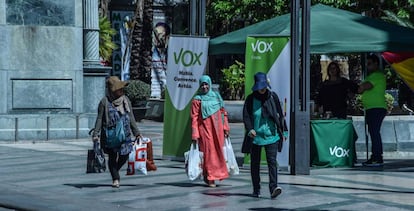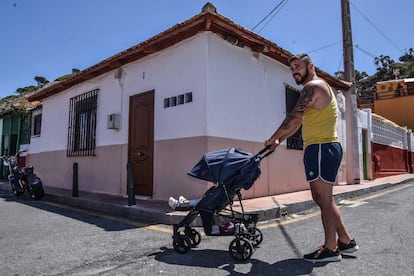Ceuta: Vox’s anti-immigration message makes gains in a city that is 40% Muslim
The far-right party is taking advantage of tension over undocumented migrants and unemployment to attract voters in the Spanish exclave in North Africa ahead of the local election on May 26

The Spanish exclave city of Ceuta in North Africa is unlike the cities in the Spanish peninsula. In Ceuta, many locals say hello to each other with the Arabic greeting Salaam Alaikum, and the Islamic holiday Eid al-Adha is a public holiday. There is a Hindu temple, a synagogue, and every Easter, the Christ of Medinaceli is carried in a procession from a Catholic church in El Príncipe, the poorest and most Muslim neighborhood in the city. For the 85,000 people who live in the city, the mix of cultures is both a source of tension and a great achievement. It is also an issue that wins votes.
Ceuta has the second-highest unemployment rate among young people between 15 and 24 in Europe
Gabriel, a retired military member with a thin mustache and a blue tracksuit, says he will vote for the far-right group Vox at the upcoming local election of May 26. “I have always voted for the PP [Popular Party], but I am going to vote for Vox to see if they change things a bit,” he says.
Vox’s promise to build a wall along the Moroccan border and its defense of the “Mediterranean, European and Western way of life” has won great support in Ceuta.
Gabriel’s opinions reflect this shift to the right. “I don’t pay my taxes for undocumented migrants,” “I’m not in favor of building a wall, I’m in favor of every one staying in their own land,” “in this neighborhood, there is no problem with drugs because very few Muslims live here,” “wherever you go, you find 2,000 black people … and an unthinkable number are coming,” he says, pointing at the Moroccan border.
Gabriel lives in one of the neighborhoods where Vox received the highest amount of votes at the April 28 general election. But it also has a different side. As Gabriel criticizes migrants, Moroccan women dressed in hijabs who are employed irregularly to work in homes for €350 a month line up silently to buy groceries for their employers.
We do not want any more migrants here
“I have never employed a Moroccan. I have not needed to and I don’t like them,” says Gabriel, adjusting his hat.
The outcome of the May 26 election is difficult to predict, but there are two certainties: Vox will enter the local council, where more than one-third of the seats are held by Muslim politicians, and the Popular Party (PP) will lose the absolute majority it has enjoyed for 18 years. The local assembly is currently divided between the PP with 13 seats, the Socialist Party (PSOE) with four, Caballas Coalition with four, Movement for Dignity and Citizenship (MDyC) with three, and the center-right party Ciudadanos (Citizens) with one seat. But this could change dramatically in the upcoming vote.
Vox received one of its best results in Ceuta at the April 28 election, beating the PP and Ciudadanos to become the most-voted political party on the right, despite the fact more than 40% of the population in Ceuta is Muslim. Opponents warn the success of Vox is an “attack on social harmony” in the exclave city.
As well as the divide between nationalities and religions, there is the divide between the employed and unemployed. After the Spanish North African exclave city of Melillia, Ceuta has the highest rate of unemployment among young people between 15 and 24 in Europe's regions. Three out of every five young people do not have a job, according to the European Union’s statistic agency Eurostat. And their prospects of finding one are not good. Nearly half of Ceuta’s GDP depends on the public sector and beyond the irregular cross-border trade, state subsidies and seven online gambling businesses, there is no local economic model.
The cheapest home in Ceuta is a one-bedroom, ground-floor flat for €500 a month, according to Idealista
“I would like to return to Ceuta for my family, but it would have to be temporary. I did not study a degree in order to struggle there, says Cristóbal Guzmán, who studied physiotherapy at the University of Seville and returned home to hand in a blank vote at the general election. How to develop an economy in a city where the population is growing faster than the national average in an area measuring 21 square kilometers remains one of the most important issues of the May 26 election.
The high rate of unemployment, which affects three in 10 people in Ceuta, is part of the reason why there is tension with the Muslim community, says political scientist Adolfo Hernández. “I have the sickness of unemployment in my house,” says Jamila Mohamed, a 53-year-old mother of five unemployed children. “No one does anything for us. The PP just look after their own.”
Divide between rich and poor
A great chasm divides Ceuta’s upper class, who live in the center of the city and enjoy bonuses and tax cuts, and Jamila, who says she does not have enough money to buy ingredients for the the soup she eats to break the fast during Ramadan. While the main avenue of Ceuta boasts 18 street lamps worth €60,000, the locals of El Príncipe complain about 24-hour power shortages.
The economic precariousness fuels anti-immigration sentiment, and not only among supporters of Vox. “Why would they call me to clean, to take the dog out for a walk, or do the ironing for €10 if a migrant comes and charges €3?” asks Jamila Mohamed. “We do not want any more migrants here.”
Nearly 30,000 people cross the border that separates Morocco from Ceuta every day. “I saw that the border was going to be a problem,” admits Ceuta Mayor Juan Jesús Vivas, of the PP. “We need a secure and fluid border, and we are all to blame for this. We should have done it earlier.”
While the increased migratory pressure has been linked to greater insecurity, there is no official data that proves this relationship. Five people from Ceuta however, have been reported for beating up adolescent migrants with steel bars.

Adding to the tension is the rising cost of housing. On the property website Idealista, the cheapest home in Ceuta is a one-bedroom, ground-floor apartment for €500 a month. The housing shortage is pushing prices up in a city that has no room to grow.
Jonathan Seco, 33, pushes a baby stroller with the youngest of his five children outside the house of his in-laws. He is living with them because his salary as a waiter and his wife’s salary do not cover the cost of rent. “I know voting is important but I feel very resentful. This city has never given me anything. I’ve been waiting 18 years for a subsidized home,” he says, adding that immigration is part of the problem. “I have had to squat, because they give a home to people who aren’t from here before those who are.”
With all these factors in play, the local election in Ceuta is shaping up to provide its first surprises in nearly three decades.
English version by Melissa Kitson.
Tu suscripción se está usando en otro dispositivo
¿Quieres añadir otro usuario a tu suscripción?
Si continúas leyendo en este dispositivo, no se podrá leer en el otro.
FlechaTu suscripción se está usando en otro dispositivo y solo puedes acceder a EL PAÍS desde un dispositivo a la vez.
Si quieres compartir tu cuenta, cambia tu suscripción a la modalidad Premium, así podrás añadir otro usuario. Cada uno accederá con su propia cuenta de email, lo que os permitirá personalizar vuestra experiencia en EL PAÍS.
¿Tienes una suscripción de empresa? Accede aquí para contratar más cuentas.
En el caso de no saber quién está usando tu cuenta, te recomendamos cambiar tu contraseña aquí.
Si decides continuar compartiendo tu cuenta, este mensaje se mostrará en tu dispositivo y en el de la otra persona que está usando tu cuenta de forma indefinida, afectando a tu experiencia de lectura. Puedes consultar aquí los términos y condiciones de la suscripción digital.









































